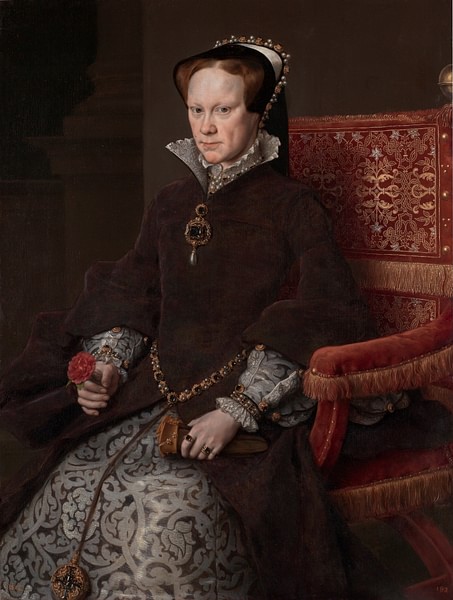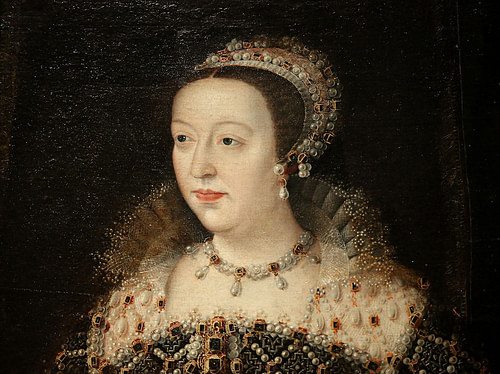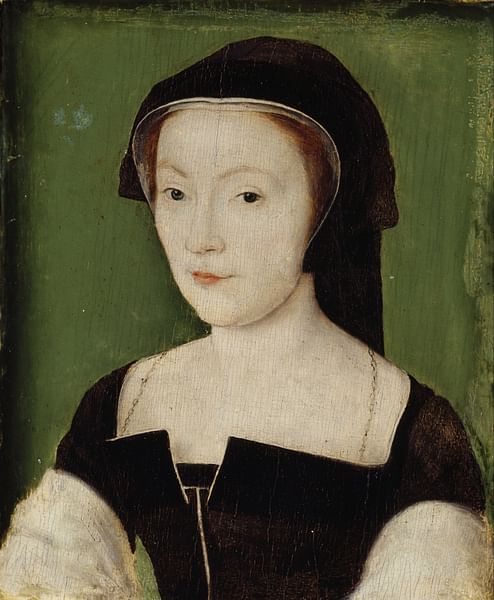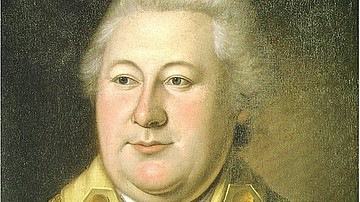The rule of women in government and ministry has long been a source of controversy in the Christian Church. Beginning with the Apostolic period, female leadership has been embraced and resisted by innumerable people, the debate centering on whether it is "natural" for a woman to have dominion over a man or even if a woman has the capacity for leadership.
In 16th-century England, a transition of political power from male to female regents, complicated by the question of religion, prompted much criticism from religious and secular parties alike. Scottish theologian John Knox (1514-1572) spent a great deal of his life battling against what he called "this monstriferous empire of women" (The First Blast of the Trumpet).
A fiery and intrepid preacher, his sermons and writings strongly (and many would say harshly) condemn the political establishment of female leadership existing at that time. Knox has often been branded a misogynist in the extreme because of works such as The First Blast of the Trumpet Against the Monstrous Regiment of Women for his rather grim and negative portrayal of women. Others, however, have promoted Knox to near-hero status for his courage and godly determination to maintain the proper natural order set up by God, despite the peril that frequently surrounded him.
John Knox
Knox was born in 1513 in Haddington, Scotland, and was educated at the University of Glasgow. He originally was a Roman Catholic priest, which, no doubt, provided Knox with a good understanding of the tenets of Catholicism. Scotland was not untouched by the Protestant Reformation, and a Scottish Protestant reformer named George Wishart began preaching near Knox.
Parliamentarian Henry Cowan explains that around 1545, "Knox came under Wishart's potent influence" (Cowan, 58) and began to re-evaluate his theology. Wishart taught him about the supremacy of Scripture, the universal priesthood of believers, justification by faith, and the scripturally unsupported ecclesiastical activities mandated by the Catholic Church. Eventually, Wishart was martyred for his alleged conspiracy in the assassination of Cardinal Beaton, and as Wishart's disciple, Knox became more resolved that the Catholic Church was not as it should be. Knox thereafter converted to Protestantism and began preaching at St. Andrews.
In 1547, in an attempt to capture St. Andrews, Knox was taken prisoner by a French fleet and subsequently spent a year and a half as a galley slave – enduring the living death the French Catholics (under Catherine de' Medici) had created to deal with those who refused to convert to Catholicism. Knox learned that to survive, his will must be steadfast, unaltering, and unyielding. Knox was ultimately released through the intervention of King Edward VI of England who died in 1553. Knox returned to England, joined the Church of England, and was appointed a royal chaplain.
When Mary Tudor became Queen of England in 1553, Knox fled to Geneva, Switzerland, where he began a devout relationship with French Protestant reformer John Calvin (1509-1564). There, Knox was greatly influenced by Calvin and impressed with his leadership and organization. Eventually, Knox made it back to Scotland and supported the Protestant revolt against Mary of Guise (1515-1560) with the help of Elizabeth I of England (r. 1558-1603).

Meanwhile, Mary, Queen of Scots (r. 1542-1567), returned to Scotland. She and Knox had several personal interviews wherein they debated Protestantism versus Catholicism. Knox acknowledged her authority as long as she followed the covenant with God as outlined in scripture, which she failed to do. Because of this, "Knox then demanded that Mary be deposed and executed" (Reid, 537), although this did not occur in his lifetime. Through her involvement in several plots against Elizabeth I, Mary was eventually executed in 1587, some 12 years after Knox's death in 1572.
Literary Works
Although John Knox is renowned for being the founder of the Presbyterian Church and author of The History of the Reformation in Scotland, he is also famous for writing other more controversial works such as The Appellation from the Sentence Pronounced by the Bishops and Clergy: Addressed to the Nobility and Estates of Scotland, A Faithful Admonition to the Professors of God's Truth in England, and The First Blast of the Trumpet Against the Monstrous Regime of Women. In each of these writings, he makes remarks and evaluations that are rather sensational (some would say repulsive) when it comes to proper monarchical rule, in order to reform and purify government and religion, with which it is so dramatically intertwined. These tracts were extremely controversial at the time, for Knox did not soften his criticisms as he laid out his admonitions, evaluations, and judgments of British and European royalty.
The Appellation
In The Appellation, although not as bluntly anti-female as The First Blast, Knox still presents a clear message that he considered the female monarchy and papacy to be lacking in character and virtue. This tract is a response to Knox's being tried, condemned, and burned in effigy by the papal authorities after a trip to Scotland in 1555 – papal authorities reinstated by Mary of Guise, the regent of Scotland, who was a staunch Catholic. Knox created this treatise for the Scottish nobility and called upon their honor to join with him in "This cause against the pestilent generation of Papists."
Knox goes on further to substantiate his theological position, but more importantly, he sets up an argument that will develop later on into a more radical notion (although it is rather drastic to start with). Naming all papists and their supporters as enemies of God, he bluntly and brazenly states, "Your power is above their tyranny" and that "No idolater can be exempted from punishment by God's law." Therefore, Knox calls on Scots to "remove such enormities from amongst them, as before God they know to be abominable." This is a direct challenge to Queen Mary I of England (r. 1553-1558) and the Catholic Church's authority in Scotland. In his personal crusade, Knox draws upon example after example in the Old Testament as a confirmation of his position.
The Admonition
In A Faithful Admonition, Knox goes on to further his stance against female rulers through several blatant and critical statements. He states, "Those bloody tyrants within the realm of England do kill, murder, destroy, and devour man and woman." It can be assumed that the "bloody tyrant" Knox speaks of is none other than Mary I, who received the nickname Bloody Mary because of the persecution of Protestants who refused to submit to her (and Bishop Pole's) Catholic dreams for England.
Knox goes on in The Admonition to correlate her with the biblical evil Pharaoh of Moses' time, the prophet Elijah's archenemy Jezebel, and Athaliah of the Old Testament, as well as Judas in the New Testament. Not only does Knox consider Mary as bad as Jezebel, she is presented as far worse, for "She [Jezebel] never erected half so many gallows in all Israel, as mischievous Mary has done within London alone." Clearly, Knox finds Mary Tudor detestable as a ruler, for in so many ways, he sees her as an idolater and traitor to the true faith of the Bible.

Knox continues to warn his English readers that if they fail to amend their ways and "contract marriage, confederacy, or league, with such princes as maintain and advance idolatry ... you shall be plagued and brought to desolation." In Knox's view, they need to return to the reformed Protestant Church established by God, which Mary I and Mary of Guise have tried to destroy. Furthermore, they need to "watch and pray, resist the devil, and row against this vehement tempest," and then God will reward them for their faithfulness.
The First Blast
With the death of Mary I in 1558, Knox probably considered their reward imminent with a return to patriarchal rule, but he was to face more disappointment and difficulty with Elizabeth I of England (r. 1558-1603) coming to the throne. Compounding this relationship was a tract Knox wrote in 1556 called The First Blast of the Trumpet Against the Monstrous Regiment of Women. Knox had written it with three women in mind: Queen mother and regent Catherine de' Medici of France, Mary I of England, and Mary of Guise, regent of Scotland. These three women, all Catholics in support of the Papacy, had been the instigation of suffering and persecution in much of Europe. In Knox's mind, they were frightfully unfit to be leaders, and in this tract, he set about to prove why.

As one reads The First Blast, it is easy to understand why many people consider it to simply be the ravings of a man who hates women. Knox utilizes brutally harsh language in his presentation and offers no positive balance to the negative criticisms regarding womanhood. Thus, he begins this treatise with "How abominable before God is the empire or rule of a wicked woman." He then states that female rule is "detestable and damnable" and "repugnant to nature" because women are "weak, frail, impatient, feeble, and foolish; and experience has declared them to be inconstant, variable, cruel, lacking the spirit of counsel and regiment."
According to Knox, the sole purpose of his writing The First Blast was to help bring back England into a right relationship with God wherein true Christian faith could be exercised and peace may reign. During this time, bloodshed was rampant, corruption was everywhere, and the situation in England was deteriorating rapidly. Of this condition, Knox states, "We see our country set forth for a prey to foreign nations; we hear [of] the blood of our brethren, the members of Christ Jesus, most cruelly to be shed; and the monstrous empire [government] of a cruel woman ... we know to be the only occasion of all those miseries." Knox sees direct correlation, and as a preacher of God, a messenger ordained to help make the way straight for the Lord, he feels the obligation to present the truth, no matter how painful it may be to hear.
Knox first substantiates his argument by pointing out all the great thinkers of history who agree with his take on the role of females. He makes reference to the writings of Aristotle, Tertullian, Augustine, Saint Jerome, Ambrose, Chrysostom, and Magnus, who all make the same assertion that "in her greatest perfection, woman was created to be subject to man" and any other state is an unnatural condition that will lead to unnecessary social strife.
Knox then points out in The First Blast biblical material such as Genesis, Corinthians, Timothy, Ephesians, and Romans that, at least superficially, appear to support his position. In his mind, any behavior contradicting this understanding is not only "to invert the order which God has established, but also it is to defile, pollute, and profane ... the throne and seat of God." In a grand sense, then, Knox considers a woman on the governmental throne to be a direct rebellion against God.
Knox further suggests that even in nature and society, a female in power is a deviant occurrence. He states, "For nature has in all beasts printed a certain mark of dominion in the male, and a certain subjection in the female." Knox adds to this the idea that whether Jew or Gentile (or even pagan), an order was established long ago with man as the natural leader. Most nations had men at the top of the hierarchy. Thus, going against the natural, God-ordained order is repugnant to nature and to justice for it gives women what is not rightfully theirs – the leadership role.
Conclusion
It is reasonable to say that Knox suffered much throughout his life at the hands of female monarchs in power – both at home in Scotland, on the English isle, and across the channel in France. He frequently saw his fellow countrymen persecuted and murdered for Reformed Christian beliefs, and he drew direct correlation between female monarchs and personal or national hardship. He saw the problems in Scottish/English culture, he saw what he thought was causing them, and he sought to have them removed.
Critics of Knox condemn his stance as "an overemphasis on the Old Testament and a pronounced literalness" (Kyle, 66), which places "the literal forms of Scripture above its substantive content" (Kyle, 66). This may be debatable, but Knox's approach to scripture is far from unique. Many modern fundamentalist groups still hold to the inerrancy of the Bible and seek to follow its commands to the letter. Because of Knox's belief in the immutability of God, an ordinance from God was always to be followed – even if it meant going against changing social order.
Knox often put himself in the spotlight with unsavory and controversial words in his sermons or tracts. In fact, "Many of his followers, as well as Calvin and Beza, were very annoyed at his blast" (Reid, 535). Knox wrote bluntly when he should have been more temperate and diplomatic. Reverend Halliday asserts that too often, Knox's "hostility towards his opponent was unqualified, his denunciation of them in temperate and savage" (Halliday, 170). Knox was not always a man of peace and was even considered to be "an embarrassment in the corridors of power" (Halliday, 170). He lived in the extreme, and he spoke in the extreme, but because of his obstinate courage and steadfast will, he still is credited for bringing about the Scottish Reformation (c. 1525-1560).
That Knox was biased against female regents is hardly debatable; however, if misogyny is defined as a universal hatred of women, then Knox, as his only condemnation of women concerns their role and political authority, may not fairly deserve that label. True, he did have a chauvinistic view of women in the hierarchical order, but that does not necessarily mean he hated them. Furthermore, a belief in the literal inerrancy of the Bible does not necessarily equate with sexism. Knox followed the dictates of the Bible because he believed in them, wholeheartedly. His sincerity of purpose most likely allowed him the privilege of conversing with the female monarchs in power (and even managed to get him married twice). Knox's approach may have been extreme, but it was also heartfelt.
With this in mind, the relevant question seems to be whether a person – regardless of their sex – has anything to offer the community and if that person, by holding that leadership position, is harming the people in their care and in their encouragement. Keeping this in mind, then (and trying not to cave to postmodern biases toward earlier cultures), what social structures are appropriate for Moses's time or the Reverend John Knox's era may not be appropriate for ours. Students of history need to, therefore, be careful not to categorically condemn all women – or all men – for something done by historical figures in a less socially progressive milieu.
Although Knox's words of condemnation are repulsive to egalitarian postmodern ears, John Knox was probably less chauvinistic than many people perceive him to be. Throughout his life, and to his credit, Knox continued to dialogue with women. He might have been a misunderstood misogynist, but nevertheless, he was still devoted to the cause of truth and justice as he saw it, read it, and experienced it, personally. Reverend Halliday summarizes the importance of John Knox when he says, "He was a preacher and writer of outstanding ability, who got things moving on a national scale by sheer force of personality, getting across to a whole people. Less obviously, but still truly, he was a pastor" (Halliday, 171). Knox felt he had a mandate straight out of the Bible, and because of who he was and what he experienced in life, he felt compelled to help (or force) others see what he considered the truth – no matter the cost.










